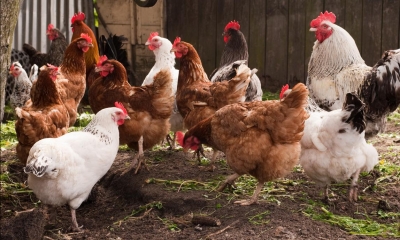
Some of the key areas where legislation is likely to affect your poultry farm are listed below.
What licences does a poultry farm need?
You should be aware of the following:
- breeding or hatchery operations are required to be registered with the Animal and Plant Health Agency (APHA) or the Department of Agriculture, Environment and Rural Affairs (DAERA) in Northern Ireland. This applies to holdings with breeding flocks of 250 or more birds, or hatcheries with incubator capacity of 1,000 or more eggs
- all laying hen establishments with 350 birds or more must register with the APHA or DAERA
- all broiler flocks must be notified to the APHA
- all commercial premises with 50 or more birds must register with the APHA for inclusion on the Great Britain Poultry Register
- poultry farms above a certain size (more than 40,000 places for poultry) must obtain a permit to operate from the Environment Agency in England, Natural Resources Wales, the Northern Ireland Environment Agency, or the Scottish Environment Protection Agency (SEPA) in Scotland
Your local trading standards department will be able to give you more information about the action you need to take.
If your business will prepare, store and sell food (that is, if you process your eggs or poultrymeat to add value) you will need to register with your local authority environmental health department. They will inspect your premises and help you to comply with the requirements of the Food Safety Act. You should contact your local authority early on in your planning so that you register in good time. There is no charge for registering.
General
- under the Egg Marking (Stamping) Regulations, all Class A eggs to be sold at retail level must be marked with a code that shows the establishment they came from, the country of origin and the method of production
- you must observe the rules laid down under the Eggs (Marketing Standards) Regulations. Among other things, these give details on how, and within what time-frame, eggs must be offered for sale to the consumer
- under the Environmental Protection Act (and subsequent regulations) you have a 'duty of care' to store waste safely and dispose of controlled waste properly by using a registered carrier or an appropriately licensed disposal facility
- under various feedstuffs legislation you have to register with Trading Standards if you mix your own feed and you have to register with the Veterinary Medicines Directorate if you mix your own feed and include substances such as antibiotics in it
- there is welfare legislation obliging you to take reasonable steps to ensure your animals' welfare and prevent unnecessary suffering
Egg production
Intensive 'enriched' production
There are regulations that specify:
- the amount of cage space a bird must have, both width and height
- how much access to food and water there should be
- a maximum level of slope to the cage
Free range, semi-intensive, deep litter and perchery production
There are regulations governing such things as stocking densities, access to outside runs and conditions of the interior of the housing units.
You can obtain details of these regulations from the British Egg Industry Council.
Broiler production
Welfare regulations specify a maximum stocking rate of 39kg per square metre for broiler production.
There are also regulations in place that specify that if broilers are produced in a free range unit, they have to be kept for a certain length of time in conditions that cannot be too crowded and that have access to an outdoor run.
Farm assurance scheme
If you choose to join a farm assurance scheme you will have to observe their code of conduct. The most common schemes are the Lion Quality Code of Practice, developed by the British Egg Industry Council, which deals solely with egg production; and the RSPCA's Freedom Foods, which deals with both egg production and poultry meat production. The majority of broiler producers are members of the Red Tractor poultry farm assurance scheme. There is more information on the BEIC, RSPCA and Red Tractor websites.
Organic
You cannot sell any of your produce as 'organic' unless you register with and comply with certain standards. See Organic farm legal issues.
Transporting animals
The Welfare of Animals (Transport) Order covers the conditions for transporting animals. If you transport animals as part of your business you must be authorised as an animal transporter. For long journeys (over eight hours), vehicles must have been inspected and approved. Drivers or attendants responsible for transporting animals more than 65km are required to hold a certificate of competence.
Health & Safety, fire
You must comply with workplace health and safety and fire safety legislation.
Employment legislation
Anyone employing staff must comply with employment legislation. Important areas of legislation include recruitment, employment contracts, pay, working hours, holidays, employment policies, sickness, maternity, paternity, discrimination, discipline, grievances, dismissals, redundancies and employment tribunals.
Agricultural businesses in the UK that use the services of gangmasters - basic labour providers - are required by law to use only gangmasters that are licensed by the Gangmasters and Labour Abuse Authority (GLAA). More information about gangmaster licensing, including a database of licensed gangmasters, is available on the GLAA website.
Insurance for a poultry farm
When you start up in business you will need insurance cover. Contact an insurer and explain to him or her exactly how your business will operate - they will then recommend what cover you should have. This might include:
- premises and premises contents
- livestock insurance
- employers liability
- third party liability
- motor insurance (for delivery vehicles)
- farm vehicle insurance (for tractors, fork lifts and so on)
NFU Mutual is one of the most popular organisations through which to purchase insurance. They, along with other specialist farm insurers, will be able to tailor a policy to fit the needs of your farm.



